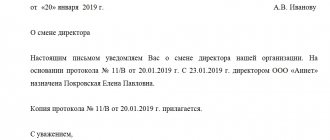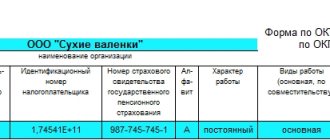When do they change DI?
In modern market conditions, changes are always taking place at an enterprise, new technologies are appearing, business processes and the structure of the organization are being revised. If new tasks appear or the range of responsibilities has expanded, then the job description will also have to be corrected. Often you will need to take into account the opinions of employees who do not always agree with innovations.
Among the reasons for adjusting the job description:
- expansion or redistribution of responsibilities to optimize labor;
- updating the staffing table;
- renaming the enterprise;
- changing the structure of the enterprise;
- introduction of new production technologies;
- the emergence of new technical regulations;
- transfer of an employee to another position;
- change of surname by the employee (for personal DI);
- amendments to legislation.
There are no clear procedures for amending labor legislation. And the employer has the right to independently determine the procedure for action (letter of Rostrud No. 4412-6 dated October 31, 2007). Provided that everything is done within the framework of legal norms.
Before you start editing your job description, you need to answer the following questions:
- How is the job description drawn up - as an annex to the employment contract or as a separate regulatory act?
- Do adjustments affect the terms of the employment contract?
- What caused the changes - the urgent need for changes in technological and organizational working conditions or other reasons?
Depending on the answer, the procedure for making changes is different.
The procedure for making changes if the job function does not change
The first stage is the preparation of specific amendments to the job description. There are no strict design rules; the essence of innovation is important here. If this is an independent document, then the procedure is not complicated. If the provisions are slightly edited (specification of the labor function), the employee’s consent is not required. An addition to the DI is being drawn up. The employer approves the document by order, and the employee signs it.
sample additional agreement to job description
Some changes to the duties of employees are made without their consent if:
- actions and wording are clarified without changing the meaning and number of responsibilities;
- the content is being specified due to the introduction of new regulations and professional standards;
- The job title is adjusted without radically changing the meaning.
The employer has the right to correct some conditions of the job description on his own initiative, for example, when updating organizational or technological working conditions. Provided that the labor function remains the same (Part 1, Article 74).
IMPORTANT!
The law requires sending the employee a written notice of changes and reasons two months before implementing these plans (Part 2 of Article 74 of the Labor Code of the Russian Federation).
If there are a large number of amendments, it is advisable to adopt a new edition of the DI. It is formed in two copies: one for the employer, the second for the employee.
If the DI is an annex to the employment contract, the procedure is more complicated. Changes are not introduced only by order of the manager. Here, even minor amendments cannot be made without the consent of the employee. This is fixed by concluding an additional agreement. The order is as follows:
- First, an additional agreement is drawn up, which lists all the innovations.
- The employer and subordinate then sign it. One copy is given to the employee, the second is left in the HR department in case of labor disputes.
How to make changes if your job function changes
In most cases, fundamental amendments to the DI are prohibited without agreement with the employee. If one or more terms of the employment contract changes, refer to Article 72 of the Labor Code.
You cannot change your job function, including transferring to another position, until the employee writes a written consent (Part 1 of Article 72).
You will not need to ask the employee for permission only in exceptional situations specified in Parts 2, 3 of Art. 72.2 (disasters, industrial accidents, organizational and technological changes, etc.).
In case of a change in job function, the procedure is as follows:
- Agree with the employee on the new norms in the DI and obtain written consent.
- Draw up an additional agreement. If the amendments are fundamental, it is also concluded in the case when the instructions are drawn up as a separate document.
- Issue an order to make adjustments.
- Introduce the new document to the employee for signature.
IMPORTANT!
The employee begins to work according to the new rules from the date noted in the agreement, and if it is not specified, then the next day after its signing (Article 61 of the Labor Code of the Russian Federation).
The order is drawn up in a random business style, since there is no single form. At the top, the basis for the changes is noted (for example, the name of the organization or the position of the employee), then the date of entry into force of the innovations. The draft corrections are drawn up as an appendix to the order. The order is issued in both cases - when the DI is a separate act and when it is part of the employment contract.
ConsultantPlus experts analyzed the procedure for making changes to the job description. Use these instructions for free.
Refer to the following order form for amending the DI.
| OOO___________ ORDER No.___________ on amendments to the job description |
In connection with _____________________________________________________________________
And based on______________________________________________________________
I ORDER:
- Include in job descriptions _____________________________________________
(names of employee positions)
the following changes:
1.1. ______________________________________________________________________;
1.2. ______________________________________________________________________;
1.3. ______________________________________________________________________.
- Inform employees of the changes in job descriptions by ___________________________________;
(specify deadline)
- Control over the execution of this order is entrusted to ___________________________.
(position and full name of the responsible person)
Director
_____________________ /____________________/
I have read the order
_____________________ /____________________/
for free
To prevent job descriptions from becoming useless papers, they must be dynamic, promptly reflecting structural, organizational, production and other changes occurring in the organization of work and labor management at a particular employer. Therefore, special attention should be paid to their timely updating. This approach makes job descriptions relevant documents, the content of which corresponds to the conditions, tasks and needs of management. How often should the text of a job description be changed? In this matter, an extreme is possible: some personnel workers, showing excessive zeal, update job descriptions annually. This is not always justified. Changes to job descriptions are necessary, for example, in the following cases:
- when official powers and responsibilities change;
- when transferred to another position (job) with the same employer;
- when an employee is assigned, along with his main job responsibilities, additional work in another or the same profession (position);
- during the reorganization of a legal entity;
- when the staffing table changes (staff reduction, introduction of a new staff unit);
- when changing the name of the organization (or making other changes to the constituent documents) or structural unit;
- when changing the surname (or initials) of the employee, if the instruction was individual (personal), etc. In some cases, individual (personal) job descriptions are used, which are written for a specific employee and contain his surname and initials in the title of the text. It is advisable to do this only as an exception. If the instructions are written for a specific person, and not for a position, then when a new employee arrives, he will not be able to sign on it; this will require making appropriate changes to it or approving a new job description.
The procedure for making changes to job descriptions may vary depending on when they are made: before the employee is hired for the corresponding position or after. In the first case, the procedure for making changes is simplified - no additional registration of the employee’s consent is required. You can create a new job description and approve it, or make changes to the job description by the appropriate order of the manager. And another situation is when management wanted to make changes to the job description of an employee already working in this position. At the same time, the procedure for making changes to job descriptions differs greatly from the nature of the changes made, namely, whether they relate to the terms of the employment contract determined by the parties or not. Labor legislation divides the terms of an employment contract determined by the parties into mandatory (necessary), i.e., conditions without which the employment contract cannot be considered concluded, and additional (optional), the presence of which is determined solely at the discretion of the parties. According to Part 2 of Article 57 of the Labor Code of the Russian Federation, the following conditions are mandatory for inclusion in an employment contract: - place of work, and in the case when an employee is hired to work in a branch, representative office or other separate structural unit of the organization located in another area - place of work with indicating a separate structural unit and its location; — labor function (work according to the position in accordance with the staffing table, profession, specialty indicating qualifications; specific type of work assigned to the employee). If, in accordance with federal laws, the performance of work in certain positions, professions, specialties is associated with the provision of compensation and benefits or the presence of restrictions, then the names of these positions, professions or specialties and the qualification requirements for them must correspond to the names and requirements specified in the qualification reference books approved in the manner established by the Government of the Russian Federation; - the date of commencement of work, and in the case where a fixed-term employment contract is concluded - also the period of its validity and the circumstances (reasons) that served as the basis for concluding a fixed-term employment contract in accordance with the current Labor Code of the Russian Federation or other federal law; — conditions of remuneration (including the size of the tariff rate or salary (official salary) of the employee, additional payments, allowances and incentive payments); — working hours and rest hours (if for a given employee it differs from the general rules in force for a given employer); — compensation for hard work and work with harmful and (or) dangerous working conditions, if the employee is hired in appropriate conditions, indicating the characteristics of working conditions in the workplace; - conditions that determine, in necessary cases, the nature of the work (mobile, traveling, on the road, other nature of work); — a condition on compulsory social insurance of the employee in accordance with this Code and other federal laws; — other conditions in cases provided for by labor legislation and other regulatory legal acts containing labor law norms.
We recommend reading: How to pay for a child’s education in an after-school group through mos ru
The employment contract may provide for additional conditions that do not worsen the employee’s position in comparison with established labor legislation and other regulatory legal acts containing labor law norms, collective agreements, agreements, and local regulations. The additional conditions in Part 3 of Article 57 of the Labor Code of the Russian Federation include the following conditions:
- on clarification of the place of work (indicating the structural unit and its location) and (or) the workplace;
- about the test;
- on non-disclosure of secrets protected by law (state, official, commercial and other);
- on the employee’s obligation to work after training for no less than the period established by the contract, if the training was carried out at the expense of the employer;
- on the types and conditions of additional employee insurance;
- on improving the social and living conditions of the employee and his family members;
- on clarification, in relation to the working conditions of a given employee, of the rights and obligations of the employee and the employer established by labor legislation and other regulatory legal acts containing labor law norms.
This list is not exhaustive and can be supplemented by agreement of the parties.
What to do if an employee does not agree with the changes
Often the corrections are not to the employee’s liking. If he refused to sign the addendum to the DI, he should proceed as follows.
In the presence of several witnesses, draw up an act of refusal to sign the document. First, read the document out loud and draw up an act of refusal to read it (if you haven’t read it) or refusal to sign (if you read it but didn’t leave an autograph under the new edition of the instructions). The act indicates positions and surnames.
If a situation arises in which the work function cannot be left the same, you will have to negotiate with the employee about different options. Transfer him to another position (Article 72.2 of the Labor Code of the Russian Federation) or dismiss him by agreement of the parties (Article 78). If the employee does not want to work in a new way and it is not possible to transfer him to another job, then the employer has the right to terminate the employment contract with him (clauses 3, 4, article 74, clause 7, part 1, article 77 of the Labor Code of the Russian Federation).
Sample notice of change in job description sample
Music
03/17/2021, 00:49
Parent agreements for the child to be on duty at school 2.3.
When constructing pipelines in protective casings, the method and technological scheme for laying the pipeline and casing are developed in the construction organization project, taking into account the adopted design of pipeline support devices, stuffing boxes or others. Letters of complaint to the customer regarding debt for construction work - Sanatorium of the construction holding SU-155, Russian Capital Bank transferred the first tranche in the amount of 500 million rubles to the developer. The money will go to the regions. It was decided to initially use these funds to pay salaries to employees, and not to continue construction work at the facilities. This is explained, first of all, by the fact that the sanatorium tries to keep the current workforce of the enterprise unchanged, in order to Filling out documents on testing knowledge on TB
Filling out documents on testing knowledge on TB - On testing knowledge of security requirements.
Samples of documents; Add. How to write a collective statement for a salary increase
How to write a collective statement for a salary increase - Describe the results that you have achieved in this position, list additional functions and responsibilities.
Specify the signs that indicate the need to increase the fee. Be sure to provide, if possible, specific numbers and graphs that clearly indicate excellent performance results, an increase in the volume of work, increased requirements, etc. We plan a visit to the boss, taking into account the testosterone level of men As a rule. Statement of claim against the bank under Article 333 of the Civil Code of the Russian Federation, reduction or cancellation of the penalty.
Statement of claim against the bank under Article 333 of the Civil Code of the Russian Federation, reduction or cancellation of the penalty - No one challenged the disposal of this property.
At the same time, the court did not take into account the following circumstances when filing a claim against the bank under Article 333 of the Civil Code of the Russian Federation, reducing or canceling the penalty. By virtue of clause 2 of Art. 218 of the Civil Code of the Russian Federation, the right of ownership of property that has an owner can be acquired by another person on the basis of a contract of sale or exchange. How to write an application for mat help
How to write an application for mat help - Your letters to psychics sent to our editor will be published here. We decide to post some of them on the site, since psychics who participated in the battles, and maybe others, can read your letters and offer you help. To write a letter to a psychic from the program Battle of Psychics, write to the address or, if you don’t have one.
We recommend reading: Apartment cost calculator








